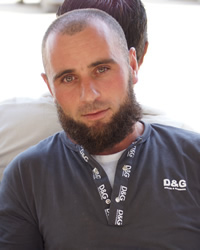Chechen in Türkiye (Turkey)

Photo Source:
CharlesFred - Flickr
Creative Commons
|
Send Joshua Project a map of this people group.
|
| People Name: | Chechen |
| Country: | Türkiye (Turkey) |
| 10/40 Window: | Yes |
| Population: | 116,000 |
| World Population: | 2,008,200 |
| Primary Language: | Chechen |
| Primary Religion: | Islam |
| Christian Adherents: | 0.00 % |
| Evangelicals: | 0.00 % |
| Scripture: | Complete Bible |
| Ministry Resources: | Yes |
| Jesus Film: | Yes |
| Audio Recordings: | Yes |
| People Cluster: | Caucasus |
| Affinity Bloc: | Eurasian Peoples |
| Progress Level: |
|
Introduction / History
The Chechens live in remote valleys of the Caucasus Mountains of southern Russia between the Caspian Sea and the Black Sea. They are a strong, determined people with a long history of fighting for their independence. Soviet rule dominated the Chechens during the first half of the 20th century. For years the Chechens had based land tenure upon joint-clan ownership. When the Soviets introduced the idea of property ownership by society rather than by clan, the Chechens fiercely opposed it.
When World War II broke out, most Chechens opposed the Germans and fought alongside the Red Army. Despite this, in 1944 many of the Chechens and their neighbors, the Ingush, were deported to Central Asia. They were allowed to return after 1968. On October 27,1991, the Chechen Republic declared its independence. Russian troops invaded Chechnya to regain control, and as a result much of the region lies "in ruin". To make matters worse, Chechens have a problem with organized crime in their midst, causing even more mayhem in southern Russia. These are two of the reasons many have left to find safer places to raise their families. Though Chechens are in many Western European countries, Turkey is their favorite destination.
What Are Their Lives Like?
Most Chechens in Turkey have refugee status, which hinders their ability to send their children to school and get their lives re-started. There is a question regarding whether or not Chechens can stay in Turkey.
The core of Chechen society is the taip, a clan-like organization whose members descend from a common ancestor. An assembly of elders, with their own court, rule each taip. Chechens generally marry outside their own clans. Marriage between blood relations is forbidden within a span of three generations. The bridegroom's family pays a fee to the bride or her family as a guarantee against divorce.
What Are Their Beliefs?
Ruins of church buildings indicate that at least some Chechens had converted to Christianity by the eighth century. During the 16th century Islam was introduced by other peoples who settled among the Chechens. By the late 17th century all remaining ties to Christianity had disappeared from this region and replaced with Sunni Islam. Despite this, some Christian heritage can be seen in the Chechen language. Their word for Sunday translates to "God's day," and the word for Friday translates to "day of Mary."
In recent decades they have used Islam as a banner for Chechen nationalism. None would dare to become a “Christian” like their Russian oppressors.
What Are Their Needs?
Chechens need a hunger for true holiness and righteousness, personified by Jesus Christ. As it stands, Islam is both their religion and their banner for nationalism.
Prayer Points
Pray for the endurance and protection of the few known Chechen believers.
Pray for the Lord to give dreams and visions of the victorious Christ to Chechen leaders.
Ask the Lord to tear down barriers to the gospel and pave the way for Chechen disciples to make more disciples.